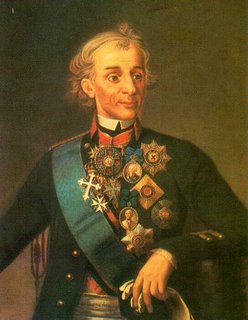
This is coolbert: In a number of previous posts I have spoken about Napoleon. His ability, and his dominance of the battle fields of Europe from his ascendancy in 1796. How Napoleon seemed to be invincible as a general, how he shook up in a very marked way the established order in "Europe. And how Napoleon was benefited by having to fight coalition forces and having arrayed against him incompetent general after incompetent general. It seemed for a time that Napoleon was unbeatable.
Well, during the time of Napoleon, in the early years, 1796-1800, there was a general that had the ability to at least match Napoleon, and probably could have beaten him. That was General Alexander Suvorov of Russia. This man is hardly ever mentioned by military histories, and when he is, only but in passing. And this is strange. Suvorov did die in 1800, but prior to that he was one of the most successful generals in history, fighting 63 battles and losing none of them. Alexander the Great and Lord Nelson of Trafalgar are the only other such commanders in history, to have fought and not lost. Why Suvorov is given such short shrift by historians is a mystery. The Soviet defector Vladimir Rezun, when picking a pen name, choose the name of Suvorov [he called himself Victor Suvorov] out of admiration for the man. Perhaps an appreciation of Suvorov is limited only to Russia. But that is not completely so. Click here and here to see good web sites about Suvorov. These are business web sites that promote the philosophies of Suvorov in an attempt to show how the leadership style of men such as Suvorov are applicable to the business world and can make for the "captains of industry" to be better leaders and head better businesses. Even if they are business web sites and not military, the thoughts and ideas are still applicable.
Many interesting quotes can be attributed to Suvorov. Among them are: [my comments in bold]
"It is very difficult to do one's duty. I was considered a barbarian because at the storming of the Praga 7000 people were killed. Europe says I am a monster. I myself have read this in the papers, but I would have liked to talk to people about this and ask them: is it not better to finish a war with the death of 7000 people rather than to drag it on and kill 100,000.
- After the assault on the fortified Warsaw suburb of Praga in 1794."
This is you either pay the price now or you pay even more later.
"Strike at the enemy with humane treatment as effectively as with weapons."
Our guys at the prison in Iraq should have known and thought about this.
"The officers know that I myself am not ashamed to work at this. Suvorov was major and adjutant and everything down to corporal. I myself looked into everything and could teach everybody."
Suvorov was a man not above learning all there was to know about the soldier's lot and his job. Not above as an officer from learning and trying the most mundane tasks that face the common private.
"Otherwise we should have wasted all our time in discussion, diplomatical, tactical, enigmatical; they would have smothered me and the enemy would have settled our arguments by smashing up our tactics.
- On councils of war."
This is like the good plan today is better than the perfect plan tomorrow.
"Fight the enemy with the weapons he lacks."
If the enemy lacks air defense, use air power against him. If he lacks anti-tank weapons, use tanks against him.
"Break through without stopping. The head must not wait for the tail. Commanders of units are not to wait to report, but are to act on their own initiative with speed and judgment."
Initiative is important. If you as a leader see an opportunity, take the opportunity. That good plan now better than a perfect plan tomorrow may never exist in this case. You have to do what is the opportunity now.
"Permit me, your highness, to report that heroes are to be found also in the lower ranks.
- After the battle of Kinburn vs the Turks."
Suvorov paying tribute to the lowly soldiers who did their job and not taking the sole glory.
"One need only be on one's guard against the bottomless pit of systematic rules."
Remember the quote from Grant about not relying on hard and fast rules for war? That will lead to defeat.
"Large staffs - small victories."
Too much planning leads to indecision. Good plan now over the perfect plan tomorrow.
"Training is light and lack of training is darkness."
Like the quote from Roman times [training is bloody battles and war is bloodless battles] [paraphrasing].
"A trained man is worth three untrained. That's too little, say six, six is too little - say 10 to one."
Many quotes previously along these line. It is not the numbers alone. It is having numbers of trained men. And a few number of the latter will suffice than a much greater number of the former.
So here we have Suvorov in a nutshell. And why is he not touted and claimed as one of the greats by the historians?? Hard to tell. Let the reader me the judge.
coolbert.

0 Comments:
Post a Comment
Subscribe to Post Comments [Atom]
<< Home